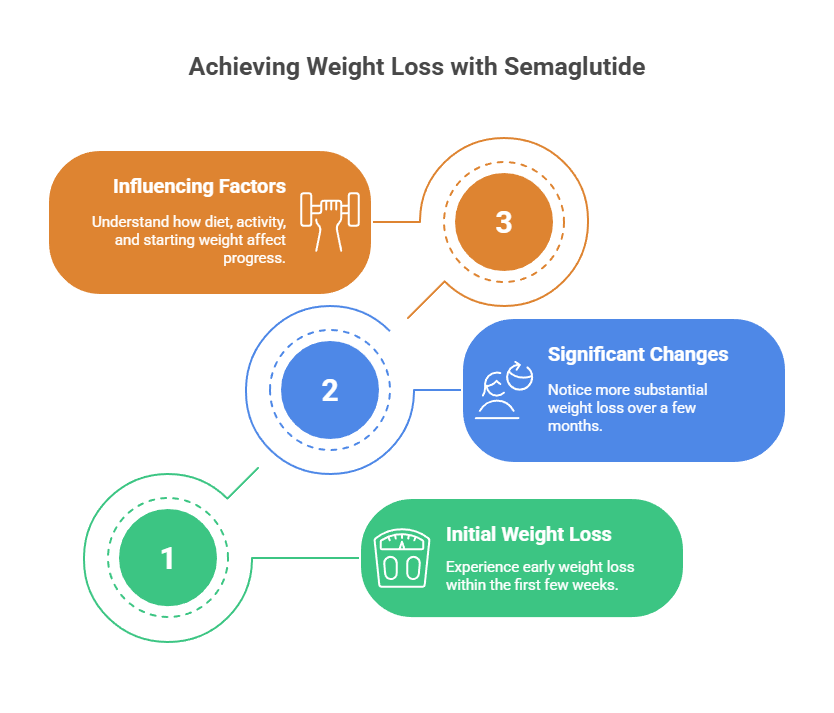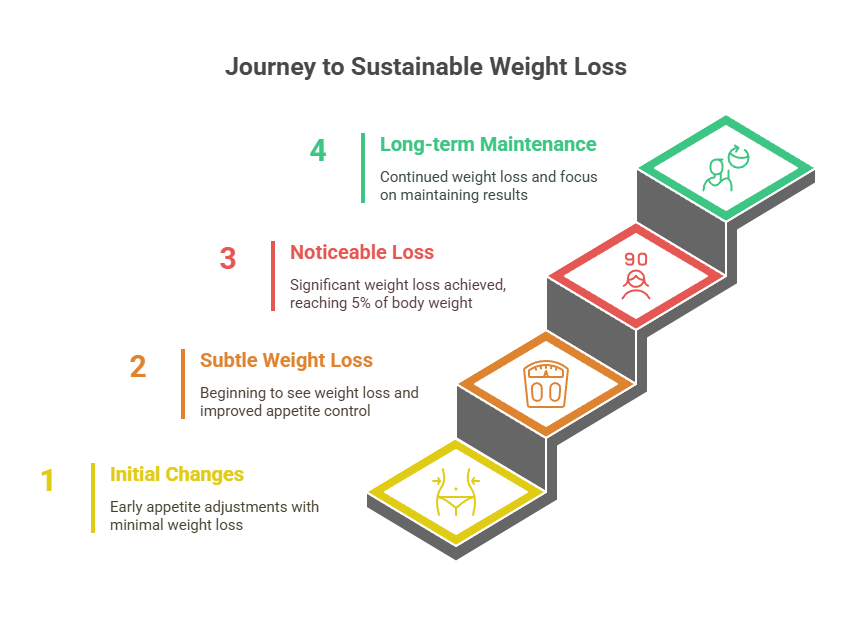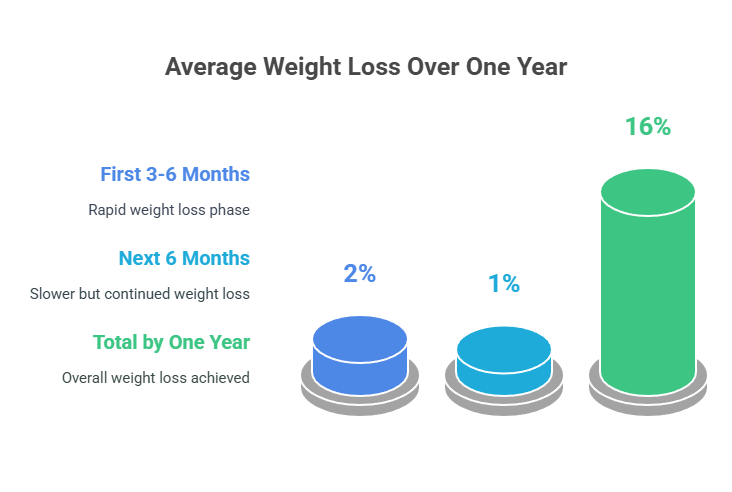Ever wondered, “How Fast Can You Lose Weight on Semaglutide?” It’s a question a lot of people are asking these days. Semaglutide has really changed the game for weight loss, but it’s not a magic bullet that works overnight. The speed at which you might see results can be different for everyone. So, let’s break down what semaglutide is, how it helps with weight loss, and what you can realistically expect in terms of how fast you might shed those pounds.

Key Takeaways
- Semaglutide aids in weight loss by replicating a hormone that influences both appetite and digestion.
- Weight loss on semaglutide usually starts within the first few weeks, but bigger changes often take a few months.
- Things like your diet, how active you are, and even your starting weight can affect how quickly you lose weight with semaglutide.
What Is Semaglutide and How Does It Work?
If you’ve been looking into ways to manage your weight, chances are you’ve heard about semaglutide. It’s a medication that’s really made waves, especially for folks who’ve had a tough time losing weight with just diet and exercise. Semaglutide’s original purpose was to manage blood sugar in individuals with type 2 diabetes, but then doctors noticed something pretty cool: it also helped people shed pounds. So, how does this stuff actually work its magic?
The Science Behind Semaglutide
Semaglutide is part of a class of drugs called GLP-1 receptor agonists. Think of GLP-1 as a natural hormone your body makes, especially after you eat. This hormone does a bunch of things, when your blood sugar increases, it encourages your pancreas to make more insulin, which is super important for people with diabetes.
But it also plays a big role in how full you feel and how quickly food moves through your stomach. Semaglutide basically mimics this natural hormone, but it sticks around in your body for a lot longer, giving you those effects for an extended period.
When you take semaglutide, it starts working on those GLP-1 receptors. This means it helps slow down how fast your stomach empties, so you feel full for longer after meals. It also helps reduce your appetite, helping you feel full longer, which cuts down on unnecessary snacking. In addition, it helps bring down elevated blood sugar, which is a nice bonus even if you don’t have diabetes.
How Semaglutide Leads to Weight Loss
So, how does all that translate into losing weight? Well, it’s pretty straightforward:
- Reduced Appetite: By making you feel less hungry, semaglutide helps you naturally eat fewer calories. It’s not about willpower; it’s about your body sending different signals.
- Increased Fullness: When food stays in your stomach longer, you feel satisfied for a longer time. This means you’re less likely to reach for that second helping or raid the fridge an hour after dinner.
- Better Blood Sugar Control: While not directly a weight loss mechanism, stable blood sugar can help prevent energy crashes and cravings, which often lead to unhealthy eating habits.
It’s important to remember that semaglutide isn’t a magic bullet. It’s a tool that can really help, its effectiveness increases when supported by good nutrition and regular exercise. Think of it as a helpful partner in your weight loss journey, not the whole solution. For more details on how this medication works, you can check out information on semaglutide’s mechanism.
Administration and Dosage
Semaglutide is typically given as an injection, usually once a week. Don’t worry, the needles are super tiny, and most people find it pretty easy to do themselves. There’s also an oral version available, but the injectable form is more commonly used for weight loss. Typically, your doctor begins with a low dose and slowly raises it over weeks or months. This slow increase helps your body get used to the medication and can help reduce any side effects you might experience, like nausea or an upset stomach. It’s all about finding the right dose that works for you without causing too much discomfort.
Average Weight Loss Timeline on Semaglutide
When you start on semaglutide, it’s not like flipping a switch. It’s more of a gradual process, and understanding the typical timeline can really help manage your expectations. You won’t wake up tomorrow 20 pounds lighter, but with consistency, you’ll definitely see changes.
The First Few Weeks: Getting Started
Right after you begin taking semaglutide, you might not see a huge drop on the scale. That’s totally normal. The medication needs a little time to get into your system and start doing its thing. What many people notice first is a change in their appetite. You might feel less hungry, or get full faster.
This is a good sign that the medication is starting to work, even if the numbers on the scale aren’t moving much yet. It’s all about setting the stage for future progress. For those looking for weight loss semaglutide near me, understanding this initial phase is key.
Weeks 4-8: Subtle Shifts and Early Progress
By about the four-week mark, you might start seeing some actual weight loss. It’s usually not dramatic, but it’s there. Think of it as a gentle nudge in the right direction. As you continue, by week eight, things often become a bit more noticeable. This is when many people report feeling more in control of their eating habits and seeing more consistent, albeit still modest, drops in weight. It’s a period of building momentum.
It’s important to remember that everyone’s body responds differently. While there are general timelines, your personal journey might vary slightly. The secret is to remain patient and committed to both your medication and lifestyle changes.
Weeks 12 and Beyond: Significant Changes and Maintenance

This is where a lot of people really start to see significant progress. By 12 weeks, many individuals have lost a noticeable amount of weight, often reaching or exceeding 5% of their initial body weight. This is also around the time when your doctor might adjust your weight loss semaglutide dose to find the optimal level for you.
The goal is to find a dose that helps you continue losing weight effectively while minimizing any side effects. Beyond this point, the weight loss often continues, sometimes at a steady pace, sometimes with plateaus. The focus shifts to sustained progress and eventually, maintaining your new weight. The concept of weekly weight loss on semaglutide becomes more apparent as you track your progress over these longer periods.
- Week 1-4: Initial appetite changes, minimal weight loss.
- Week 4-8: Subtle weight loss begins, increased appetite control.
- Week 8-12: More noticeable weight loss, often reaching 5% of body weight.
- Week 12+: Continued weight loss, potential dose adjustments, focus on long-term maintenance.
The journey with semaglutide is a marathon, not a sprint. With commitment and patience, the results can be profoundly life-altering for many.
Key Factors That Affect Weight Loss Speed
Losing weight with semaglutide isn’t just about the medication itself; a bunch of other things can really change how fast you see results. It’s not a one-size-fits-all deal, and what works for one person might be totally different for another. Understanding what affects your journey can help you stay realistic and may help things move faster.
Starting Weight and Body Composition
It might sound obvious, but your starting weight plays a pretty big role. Generally, people who have more weight to lose tend to see quicker, more dramatic initial drops. Think about it: if you’re starting at 300 pounds, losing 10 pounds is a smaller percentage of your total weight than if you’re starting at 180 pounds.
The bigger the initial difference, the more noticeable the early progress often is. Also, your body composition—how much muscle versus fat you have—can affect things. Muscle burns more calories at rest, so someone with more muscle might have a slight metabolic advantage.
Diet and Calorie Intake
Semaglutide helps by making you feel full and reducing cravings, but it’s not magic. You still need to pay attention to what you’re eating. If you’re consistently consuming more calories than your body uses, even with the medication, weight loss will slow down or stop. Prioritizing nutrient-rich foods such as lean proteins, fruits, and vegetables, while watching portion sizes, is crucial. Sugary drinks and highly processed snacks can really sabotage your efforts, even if you don’t feel as hungry.
It’s easy to think the medication does all the work, but it’s more like a really helpful tool. You still have to put in the effort with your food choices. It’s about creating a calorie deficit, and semaglutide just makes that part a whole lot easier to manage.
Physical Activity Levels
Adding consistent physical activity helps accelerate your weight loss journey. It doesn’t mean you have to become a gym fanatic overnight. Even simple things can make a difference:
- Walking: Aim for a brisk walk most days of the week.
- Strength Training: Muscle growth boosts your metabolism, helping you burn calories at rest.
- Daily Movement: Take the stairs, park further away, or do some light stretching throughout the day.
Combining semaglutide with exercise helps you lose fat while preserving muscle, which is key for long-term success and a healthier metabolism.
Individual Metabolic Response
Everyone’s body reacts a little differently to medications. Some people might respond very quickly to semaglutide, experiencing significant appetite suppression and rapid weight loss, while others might have a more gradual response. This can be due to individual metabolic rates, genetic factors, and how your body processes the medication. It’s why patience is often a virtue when you’re on this journey.
Adherence to Treatment and Dosage Progression
Semaglutide dosage typically increases gradually over several weeks or months. Sticking to your prescribed schedule and dosage is really important. If you miss doses or don’t follow the progression plan, it can affect the medication’s effectiveness and, consequently, your weight loss speed. Consistency is key to getting the full benefit from the treatment.
Real Patient Results: What the Studies Show
When you’re thinking about a new medication, especially for something like weight loss, it’s totally normal to wonder, “Does this actually work for real people?” We’ve all seen those ads with perfect-looking models, right? But what do the actual studies say about semaglutide and weight loss? Let’s dig into the numbers and see what happened with folks who took it.
Initial Weight Loss Phase
So, right off the bat, many people see some pretty quick changes. It’s not like you take the first shot and suddenly drop 20 pounds, but the initial weeks often show a noticeable difference. Think of it as the kick-off phase. Studies have shown that people often start losing weight within the first month. It’s not just a trickle; it can be a steady decline.
For example, some data points to individuals losing around 12% of their starting body weight by about week 16. That’s a decent chunk, especially if you’re starting at a higher weight. Imagine someone who weighs 200 pounds; that could mean losing about 24 pounds in roughly four months. That’s a pretty good start and can be really motivating.
Sustained Weight Loss Over Time
Now, it’s not just about that initial burst. The real question is, can you keep it going? And the answer, based on the studies, is yes, for many people. After that initial rapid loss, the rate of weight loss tends to slow down a bit, but it doesn’t stop. Over a longer period, like a year or more, the total weight loss can be quite significant.

Many studies indicate that participants can achieve a total weight reduction of around 15-16% of their original body weight by the 68-week mark. So, if we go back to our 200-pound person, that could mean a total loss of 30 to 32 pounds over that longer period. It’s not a magic bullet that makes you skinny overnight, but it’s a consistent, measurable change.
It’s important to remember that these are averages. Some people might lose more, and some might lose a bit less. Everyone’s body is different, and how you respond to semaglutide can depend on a bunch of things, like your starting weight, your diet, and how much you move around. But the overall trend in the studies is clear: semaglutide helps people lose weight and keep it off for a good while.
What the Numbers Really Mean
Let’s break down some of the typical findings you see in these studies. It helps to visualize it.
- First 3-6 Months: This is often where you see the most rapid percentage of weight loss. People might lose an average of 2% of their body weight each month during this period.
- Next 6 Months: The pace usually slows down, but it’s still happening. You might see an average of 1% of body weight lost per month.
- Total by One Year: By the end of the first year, many participants in clinical trials have achieved an average total weight loss of around 16% of their initial body weight.
This isn’t just about the number on the scale, either. Losing this amount of weight can have a big impact on your overall health, like improving blood sugar levels, blood pressure, and even how you feel day-to-day. It’s about more than just looking different; it’s about feeling better and being healthier.
Tips to Maximize Weight Loss on Semaglutide
So, you’re using semaglutide for weight loss and you want to make sure you’re getting the most out of it, right? It’s not just about the shot; it’s about how you live your life alongside it. Think of semaglutide as a really good coach, but you still have to show up for practice. To really see those numbers on the scale drop and feel better, you gotta put in some work. It’s a team effort between you and the medication.
Diet Adjustments for Better Results
Okay, let’s talk food. Semaglutide helps by making you feel full faster and for longer, which is awesome. Still, you can’t just eat whatever you want, even if you’re eating less overall. Choose nutrient-dense foods to nourish your body effectively. This involves eating generous amounts of fruits, vegetables, lean protein, and whole grains.
Think about what your body needs rather than just what you crave. Cutting down on processed stuff, sugary drinks, and unhealthy fats is a big deal here. It’s not about deprivation, but about making smarter choices. You’ll find that with semaglutide, those cravings might not even be as strong, which makes healthy eating a lot easier. Hydration is also super important; sometimes, your body mistakes thirst for hunger, so keep that water bottle handy.
Incorporating Physical Activity
Moving your body is non-negotiable if you want to maximize your weight loss. And no, you don’t have to become a marathon runner overnight. Start small! A brisk walk every day, taking the stairs instead of the elevator, or even just dancing around your living room can make a difference. The goal is to increase your activity level.
Working out helps you burn calories, develop muscle that speeds up metabolism, and boosts your mood. Find something you actually enjoy doing, when it feels like a burden, sticking with it becomes much harder. Consistency is key here, even if it’s just 30 minutes most days of the week. It’s about building a sustainable habit.
The Importance of Consistency and Monitoring
This might sound obvious, but taking your semaglutide exactly as prescribed is super important. Don’t skip doses, and don’t try to adjust it yourself. Your doctor set up that schedule for a reason. Beyond the medication, consistency in your diet and exercise habits is where the real magic happens. It’s not about being perfect every single day, but about making good choices most of the time.
It’s easy to get discouraged if the scale isn’t moving as fast as you’d like, always remember that successful weight loss happens over time, not overnight. Small, consistent efforts add up over time to big results.
Make it a point to communicate consistently with your healthcare professional. They’re your partner in this. Regular check-ins help them monitor your progress, adjust your dosage if needed, and address any side effects you might be experiencing. They can offer personalized advice and support, which is invaluable when you’re trying to lose weight with semaglutide. Your healthcare provider wants you to ask questions and express concerns openly.
Conclusion
So, we’ve talked a lot about Semaglutide and how it can help with losing weight. It’s pretty clear that it’s not a magic pill, and you won’t drop 20 pounds overnight. For most, noticeable changes appear within a few weeks, but the real, noticeable results usually take a few months. Think of it like planting a tree; you don’t get fruit the next day.
Things like what you eat, how much you move, and even your starting weight all play a part in how fast you see progress. If you’re thinking about trying Semaglutide, definitely chat with your doctor first. They can help you figure out if it’s a good fit for you and make sure you’re doing it safely. It’s all about finding what works best for your body and your life.
Frequently Asked Questions
How does Semaglutide help with weight loss?
By imitating a natural hormone, Semaglutide supports your weight loss efforts. It makes you feel full faster and for longer, so you eat less.It slows gastric emptying, keeping food in your stomach longer, which helps control your appetite. This combination leads to eating fewer calories and, over time, losing weight.
How soon will Semaglutide begin to show weight loss effects?
In the initial weeks of taking Semaglutide, most users observe weight loss, often noticing less hunger. More significant weight loss usually becomes clear around 12 weeks into treatment. The biggest changes often happen over 5 to 6 months as your body adjusts and the dose is slowly increased.
How much weight do people usually lose using Semaglutide?
The amount of weight you can lose with Semaglutide varies, but studies show that many people lose about 10-15% of their starting body weight over several months. Some might lose more, especially when paired with improvements in diet and physical activity. It’s important to remember that everyone’s body is different, so results can vary.
If you have any additional questions or if you would like to see if semaglutide is right for you, feel free to reach out to us, and receive a free consultation and body analysis. 727-550-0855.

